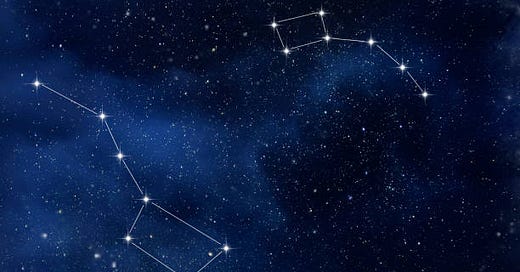Today’s essay is a bit of a cheat, in the sense that the Big Dipper is not actually a recognized constellation—at least according to the IAU. Instead, it is recognized as a smaller part of Ursa Major, the Big Bear. But the brightness of its stars makes it fairly recognizable. It’s probably the earliest constellation that many of us were able to pick out of that inky black velvet night sky.
In the UK and Ireland, it is known as The Plow (Plough). When I was in St. Andrews last fall, it greeted me every time I went for a nighttime walk on the beach.
The Big Dipper is what is known as an asterism, which is defined as an observed pattern or group of stars in the sky. The 88 officially recognized constellations are asterisms, but any grouping of stars, “official” or not, can be an asterism. The recognized constellations that we see at night divide the sky into various segments, but an asterism can stretch across those divides.
Aster comes from the Latin, meaning star. The woodland flower of the same name was given its name because its petals reminded botanists of the star-shape we all come to know and love.
In the Sámi traditions of Northern Europe, the Big Dipper is the bow of the hunter Fávdna. In the myth, Fávdna is poised and ready to shoot down Sarva, the Great Reindeer, who takes up half the sky. But Fávdna hesitates, afraid of hitting Polaris. Because to hit Polaris would cause the night sky to collapse and end the world.
And so Fávdna waits, held forever in the sky, paralyzed by the knowledge that the act of vanquishing the reindeer might unleash a different kind of chaos altogether.
Keep reading with a 7-day free trial
Subscribe to Notes From a Small Planet to keep reading this post and get 7 days of free access to the full post archives.




